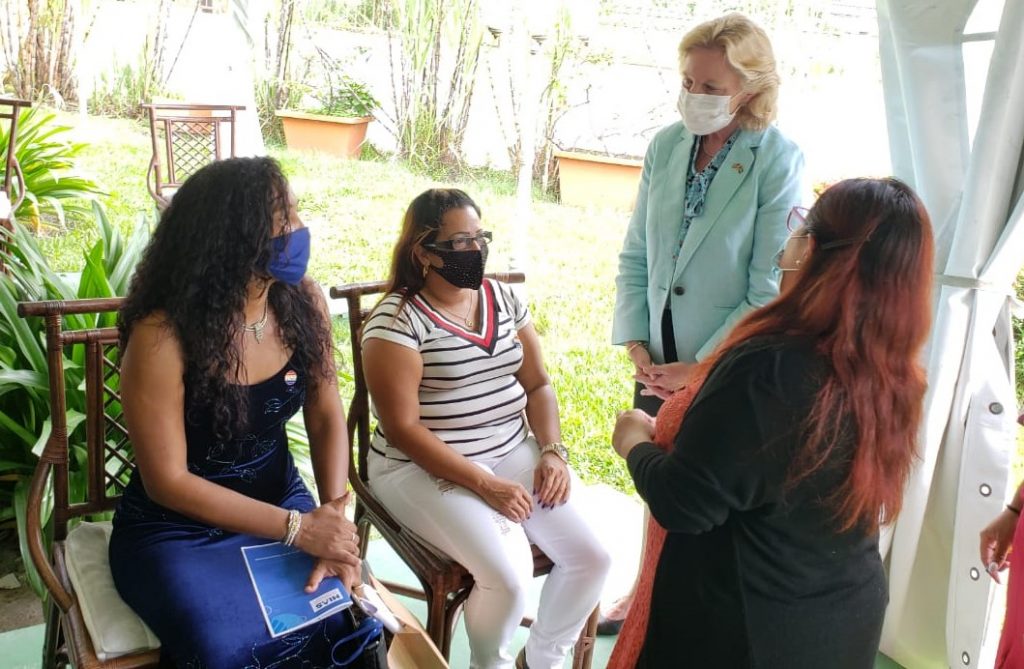
By Shikema Dey
Meet Venezuelan nationals, Sabrina Flores and Ginacar Amaiz.
They are among the millions of women, who fled their home country in search of a better life for their families as a result of Venezuela’s migrant crisis which has become the second-largest displacement event in the world, with a staggering 4.6 million people leaving the country due to a lack of security and basic rights.
There have never been more people seeking safety and so few places are willing to protect and welcome 82.4 million people are fleeing persecution.
On Tuesday, during an event to observe World Refugee Day at the Herdmanston Lodge, in Georgetown, both women shared their stories of how they escaped Venezuela and fled to Guyana.
Sabrina, a single mother, said she travelled to Guyana by boat on a 10-day journey in the sun and rain eating fish to survive and hiding from Coast Guards so as not to be caught.
“We felt like fugitives, criminals even,” she said through an interpreter.
Sabrina was an Engineer in her home country, working with the Ministry of Communities to construct houses for those living in poor conditions in Venezuela.
Because she worked with the government, Sabrina was popular and it was that popularity that led to her house being destroyed by robbers.
Fearing for her safety, she packed up what was left of her life and came to Guyana in search of better.
“I am a professional who has not been asked how I felt until today,” Sabrina said. “My children, God bless them, have been affected by all those experiences…you think you are okay but you are not.”
Since coming to Guyana, she, like Ginacar Amaiz, has been supported by HIAS – the Jewish American nonprofit organisation that provides humanitarian aid and assistance to refugees.
A grateful Sabrina emphasised that Venezuelans are not in Guyana to make her home country “look bad” but to be “reborn for the better.”
“If it was possible, we would like to return to our country but for now, we are here and we are grateful to have found safety in Guyana.”
Ginacar Amaiz was a teacher for 14 years before she fled Venezuela in 2017. According to her, for refugees, living away from their home town is not an easy task.
“Sometimes we encounter obstacles that make the process of adaptation quite complicated,” she said, noted that organisations like HIAS have been providing the needed support to help give Venezuelan migrants a normal life.
“I have now a small business in which I offer childcare services for children, offering dynamic classes to learn in a funny way.
“For me, it is more than a business, it is a goal achieved that has not only helped me in my personal growth, but it has led me to obtain self-sufficiency and economic independence in a country where employment opportunities for Venezuelans are low,” Ginacar related.
More than 5,000 refugees supported since 2020
HIAS Guyana has been playing its part to ensure that refugees are given the chance to start over. The Country Director, Alex Theran highlighted that for 2020 alone, more than 5,000 Venezuelan refugees have received support from the organisation.
She said that many refugees need urgent services, as well as long-term support systems, like economic support, legal aid and psychosocial care, in order to gain greater stability and rebuild their lives in Guyana; this is what is provided by HIAS.
Meanwhile, the United States (US) Ambassador to Guyana, Sarah-Ann Lynch, applauded Guyana’s efforts in the crisis as it did not shut its doors to the migrants despite the strain on the country’s security, health, education, and economy.

The Ambassador recalled her own experience back in 2017 when she had a first-hand look at the desperation of Venezuelan refugees crossing into Colombia at the border.
“Someone claiming to stay for a long time, some a few days, and some just for a few hours to get a good meal.
“Maybe it’s a job or a few dollars for their hair. Yes, many of the women I met with had left their homes in Venezuela to sell their hair for wigs in Colombia, to help feed their children back in Venezuela,” the Ambassador recalled.
As such, she said the US lends its support to organisations like HIAS, the United Nations High Commissioner for Refugees (UNHCR), and the United Nations Children’s Fund (UNICEF) among others to ensure Guyana continues its efforts to respond to the protection needs of vulnerable Venezuelan migrants and asylum seekers.
This year, World Refugee Day is celebrated under the theme “Together we feel, learn, and shine.”






Sadly most Venezuelans were Chavistas because they all enjoyed the free handouts not thinking that it would end badly one day. It is truly sad what happened to one of the most beautiful and richest Countries in the Americas. And in many other Countries people want the far left to come in and give them gifts not having the foresight to see that the money for the gifts will run out sooner rather than later.